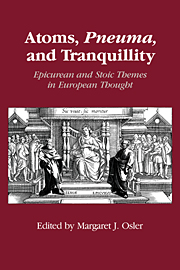Book contents
- Frontmatter
- Contents
- List of contributors
- Acknowledgments
- Introduction
- 1 Ethics and logic in Stoicism
- 2 Medieval connectives, Hellenistic connections: the strange case of propositional logic
- 3 Stoic psychotherapy in the Middle Ages and Renaissance: Petrarch's De remediis
- 4 Alonso de Cartagena and John Calvin as interpreters of Seneca's De clementia
- 5 The Epicurean in Lorenzo Valla's On Pleasure
- 6 Seneca's role in popularizing Epicurus in the sixteenth century
- 7 Stoic contributions to early modern science
- 8 Fortune, fate, and divination: Gassendi's voluntarist theology and the baptism of Epicureanism
- 9 Epicureanism and the creation of a privatist ethic in early seventeenth-century France
- 10 Robert Boyle on Epicurean atheism and atomism
- 11 Stoic and Epicurean doctrines in Newton's system of the world
- 12 Locke, Willis, and the seventeenth-century Epicurean soul
- 13 The Epicurean new way of ideas: Gassendi, Locke, and Berkeley
- 14 The Stoic legacy in the early Scottish Enlightenment
- Index
7 - Stoic contributions to early modern science
Published online by Cambridge University Press: 13 November 2009
- Frontmatter
- Contents
- List of contributors
- Acknowledgments
- Introduction
- 1 Ethics and logic in Stoicism
- 2 Medieval connectives, Hellenistic connections: the strange case of propositional logic
- 3 Stoic psychotherapy in the Middle Ages and Renaissance: Petrarch's De remediis
- 4 Alonso de Cartagena and John Calvin as interpreters of Seneca's De clementia
- 5 The Epicurean in Lorenzo Valla's On Pleasure
- 6 Seneca's role in popularizing Epicurus in the sixteenth century
- 7 Stoic contributions to early modern science
- 8 Fortune, fate, and divination: Gassendi's voluntarist theology and the baptism of Epicureanism
- 9 Epicureanism and the creation of a privatist ethic in early seventeenth-century France
- 10 Robert Boyle on Epicurean atheism and atomism
- 11 Stoic and Epicurean doctrines in Newton's system of the world
- 12 Locke, Willis, and the seventeenth-century Epicurean soul
- 13 The Epicurean new way of ideas: Gassendi, Locke, and Berkeley
- 14 The Stoic legacy in the early Scottish Enlightenment
- Index
Summary
INTRODUCTION
Although there are clear indications of Stoic influence in a variety of scientific contexts during the sixteenth and seventeenth centuries, the Stoic contribution to early modern science has been almost completely ignored. The silence of modern historians of science is a striking contrast to writers in other fields – for example, politics and literature – where Stoic influences are widely acknowledged and accorded considerable importance. I will attempt here to do two things. First, I will make a case for Stoic influence in early modern science; and second, I will discuss how this influence occurred. My conclusion will be that investigating the transmission of Stoic ideas obliges us to examine the wider cultural context of science. This is not an argument for externalism as a substitute for internal history of science; I take the position that Stoic influence can only be understood by combining both perspectives.
The recognition of Stoic influence has been hampered by the lack of a detailed historical argument for the transmission of specifically Stoic scientific ideas. I will therefore examine the transmission and later use of the Stoic ideas found in Cicero's book On the Nature of the Gods and the subsequent employment of these ideas in sixteenth- and early seventeenth-century discussions of the substance of the heavens by Jean Pena, Robert Bellarmine, Tycho Brahe, and Johann Kepler. Last, I will briefly describe the use made of these ideas by Sebastian Basso, to underline the eclectic way in which Stoic natural philosophy was combined with other positions – for example, atomism – during the late sixteenth and early seventeenth centuries.
- Type
- Chapter
- Information
- Atoms, Pneuma, and TranquillityEpicurean and Stoic Themes in European Thought, pp. 135 - 154Publisher: Cambridge University PressPrint publication year: 1991
- 23
- Cited by



